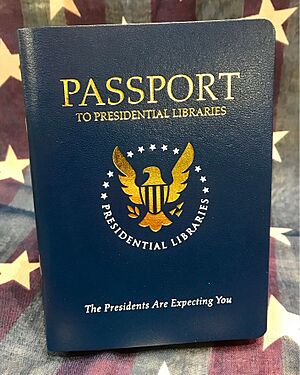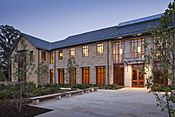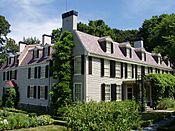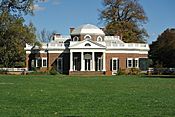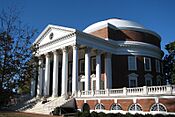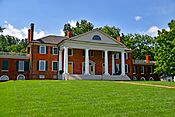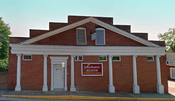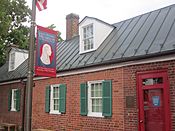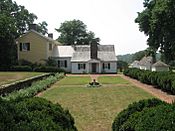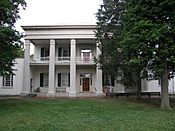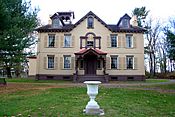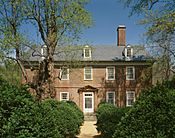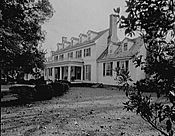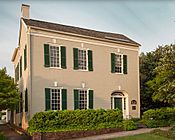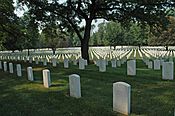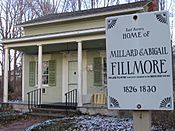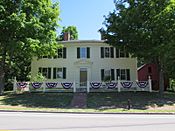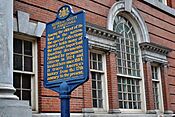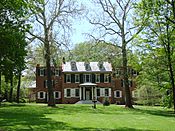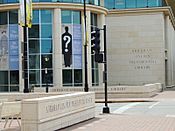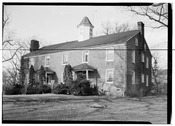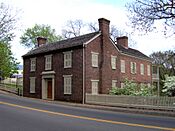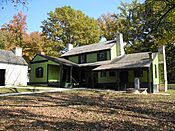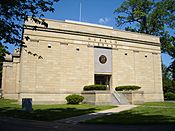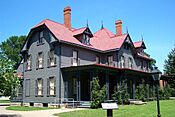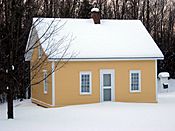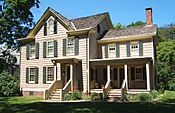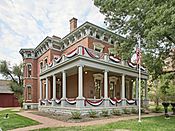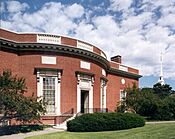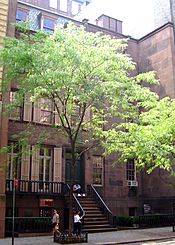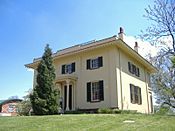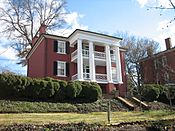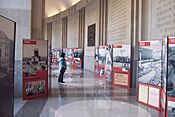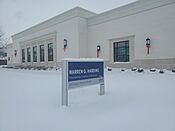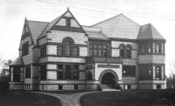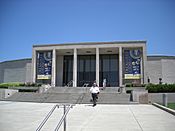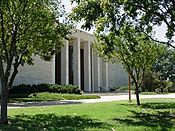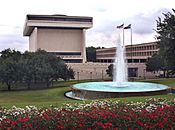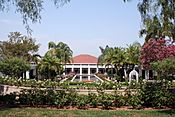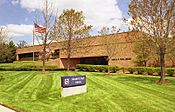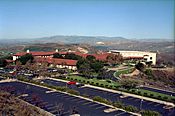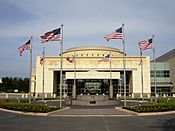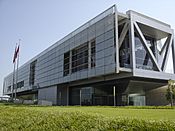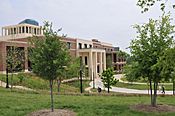Presidential library system facts for kids
In the United States, a presidential library is a special place that keeps important papers, records, and items from a former U.S. president. These libraries also have museums with exhibits about the president's life and time in office. They are managed by the National Archives and Records Administration (NARA).
Before the mid-1900s, presidents usually owned their papers. But Franklin D. Roosevelt (the 32nd president) decided to give his papers to the public. He even donated land for his library in Hyde Park, New York. Since then, laws have been made to make sure presidential documents are kept safe for everyone to see.
The newest library is for Barack Obama (the 44th president). It works a bit differently, focusing more on digital records. While NARA keeps the digital archives, a private group runs the physical center for displays.
Contents
What Are Presidential Libraries?
For every president since Herbert Hoover (the 31st president), a special library has been built in their home state. These libraries hold documents, gifts, and museum exhibits about the president's life. They also offer public programs and events.
When a president leaves office, NARA starts collecting and organizing their materials. These are kept safe until a new presidential library is built and given to the government. The very first presidential library was for Franklin D. Roosevelt, opened in 1941. The George W. Bush Presidential Center opened in 2013.
NARA even has a "passport" to encourage people to visit all the presidential libraries. If you visit them all, you get a special crystal paperweight!
Libraries Not Run by NARA
Most presidential libraries for presidents since Herbert Hoover are run by NARA. However, some libraries and museums for earlier presidents are not part of this system. They are managed by private groups, historical societies, or state governments.
For example, the Abraham Lincoln Presidential Library and Museum in Springfield, Illinois, is run by the state of Illinois, not NARA. The Richard Nixon Presidential Library and Museum in Yorba Linda, California, was once privately owned. But in 2007, it officially became part of the NARA system.
Some presidents have their papers kept at universities or historical societies. For instance, Ulysses S. Grant's papers are at Mississippi State University. Plans are also underway for a Theodore Roosevelt Presidential Library in North Dakota and a Warren G. Harding Presidential Center in Ohio.
History of Presidential Libraries
For a long time, presidents thought their official papers were their own private property. Some took their papers home, others even destroyed them. This meant many important historical documents were lost or scattered.
A very early example of a presidential collection was started by Lucretia Rudolph Garfield, the wife of President James A. Garfield. After he was assassinated in 1881, she added a library wing to their home in Mentor, Ohio. This site is now run by the National Park Service.
The National Archives and New Laws
In 1939, President Franklin D. Roosevelt decided to give his papers to the government. He believed these papers were important for the country's history and should be available to everyone. He asked the National Archives to take care of them.
In 1955, Congress passed the Presidential Libraries Act. This law encouraged future presidents to donate their historical materials to the government. It made sure these important papers would be saved and available to the public. Under this law, private groups usually raise money to build the libraries. Once built, they are given to NARA to manage.
Before 1978, presidents still largely owned their papers. But after the Watergate scandal involving President Richard Nixon, Congress passed a law in 1974. This law said that materials from the Nixon White House belonged to the public.
Then, in 1978, the Presidential Records Act was passed. This important law made it clear that all official presidential records belong to the U.S. Government. When a president leaves office, NARA takes custody of these records. This law also allowed presidential libraries to continue as the main place for these records.
Later, in 1986, another law required private groups building new libraries to also raise money for an endowment. This money helps NARA pay for some of the library's maintenance costs.
Today, with more and more records being digital, and with the increased cost of building and maintaining these libraries, NARA believes future presidents might choose different ways to preserve their history. The Barack Obama Presidential Center is an example of this "new model," where the library's materials are fully digital and managed by NARA, but the physical center is run by a private foundation.
What Do Libraries Hold?
The 13 presidential libraries run by NARA hold a huge amount of history! They have over 400 million pages of documents, nearly 10 million photos, and millions of feet of film. They also have almost 100,000 hours of audio and video recordings. Plus, there are about half a million museum objects.
These collections make each library a great place to learn about the presidency. The most important items are the papers created by the president and their staff while in office. Libraries also display many objects, like family items, campaign souvenirs, awards, and gifts given to the president by people and foreign leaders. These gifts can be anything from handmade crafts to valuable artworks.
Libraries also keep personal papers donated by people connected to the president, like Cabinet members or family friends. Many libraries have also recorded interviews with people who knew the president, creating "oral histories." Some collections even include documents from before or after a president's time in office, like Dwight D. Eisenhower's military career papers.
Most presidents since Herbert Hoover are buried at their presidential library. Notable exceptions include John F. Kennedy (buried at Arlington National Cemetery) and Lyndon B. Johnson (buried at his ranch). Jimmy Carter plans to be buried near his home in Plains, Georgia. Gerald Ford is buried at his museum in Grand Rapids, Michigan, while his library is in Ann Arbor, Michigan.
List of Presidential Libraries
This table lists presidential libraries and related sites.
Other Presidential Collections
Even for presidents who don't have a NARA library, their papers are often kept in other important places. For example, the papers of Grover Cleveland and Woodrow Wilson are at Princeton University. Theodore Roosevelt's papers are at Harvard University.
James Buchanan's papers are at the Historical Society of Pennsylvania. Projects are also underway to collect and digitize the papers of presidents like Andrew Jackson and Martin Van Buren.
Many presidents, especially those from before the NARA system, have their collections spread across different private and public archives. For example, before the Barack Obama Presidential Center is fully ready, his papers are stored in a facility in Hoffman Estates, Illinois. You can access them through the Freedom of Information Act.
See also
- United States presidential memorials
- National Archives facilities § Presidential libraries
- First Ladies National Historic Site
- Jefferson Davis Presidential Library and Museum
- Gladstone's Library
- Churchill Archives Centre
- National Churchill Museum
- Vicente Fox Center of Studies, Library and Museum
- Quayle Vice Presidential Learning Center
- Olusegun Obasanjo Presidential Library
- World's Smallest Presidential Library (David Rice Atchison)
- Perdana Leadership Foundation
 | Precious Adams |
 | Lauren Anderson |
 | Janet Collins |



